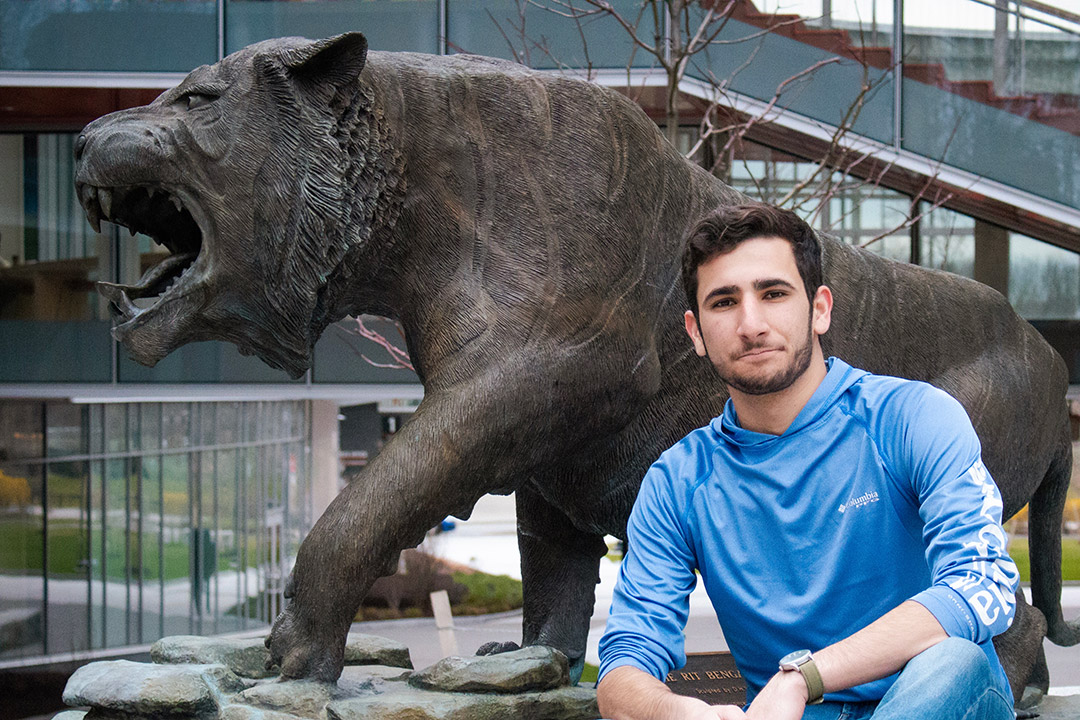CET’s Kyle Scher helps bring AI into the classroom
Undergraduate and peers help build generative AI activity and project tool to enhance coursework
Kyle Scher and three classmates have built a new AI tool for CET engineering technology courses which will be rolled out in spring.
Kyle Scher knows AI, and he’s sharing it with his peers and faculty in RIT’s College of Engineering Technology. The third-year mechatronics engineering technology student from Dix Hills, N.Y. is leading a student team developing ProGenie, an artificial intelligence tool for faculty and peers. The new tool is a collection of activities that can be incorporated into coursework being taught in various classes in CET. He has been working this fall with Michael Eastman, CET professor and senior associate dean for Academic Affairs, and three classmates from the Golisano College of Computing and Information Sciences on the project that is expected to be rolled out in the spring semester. ProGenie is one of the projects underway in CET’s Laboratory for the Advancement of Applied AI in Education.
How did you begin work on the ProGenie project?
I started working with Dr. Eastman on the AI project from a conversation we had in a Student Government meeting. I joined Student Government for a short time in my second year, opening up some opportunities to work closely with the CET Dean’s Office on cool projects. The AI project focuses on helping students stay engaged in the classroom by creating content that is tailored to them using generative AI. I am currently the project manager. RIT students, Benjamin Brundage (computer science), Stephen Zelazny-Medina, and Christopher Obando (both software engineering), help build the software.
Can you describe what it is and how it can be used?
ProGenie is an innovative tool designed to transform the educational experience by enabling educators to create tailored, narrative-driven content for any class or subject. By integrating customizable storytelling into lectures and assignments, ProGenie enhances student engagement, making complex topics more accessible and enjoyable. Versatile across STEM disciplines, it offers professors a dynamic way to enrich lessons, foster curiosity, and improve learning outcomes. While designed with educators in mind, ProGenie’s open-ended framework holds potential for broader applications, making it a transformative tool for modern education and beyond.
How does the work you are doing on this project align with coursework in your degree program?
While this project does not directly relate to my major, it has given me insight into the broader AI sector. I can see engineers in the future using AI tools as they evolve and get smarter. I would expect most engineers to be using some form of generative AI in the future. Mechatronics is a broad major. Because of this, I am now on my second co-op where I am focused more on mechanical engineering, compared to my first co-op where I was focused on electrical. Having a diverse co-op experience will help you learn more about the theoretical things you learn in the classroom. One of the big items that employers look for on resumes is personal projects. They want to see students applying a passion outside of the classroom, because they know that the number one thing students bring with them to the workforce is excitement, and willingness to learn. Try to have a personal project for every semester, or academic year to show your advancement.
How did you decide on this degree and what advice might you give to others pursuing interests similar to yours?
I enrolled at RIT knowing that I wanted to be an engineer, but I was not sure what kind. That is why I started in CET Exploration. The exploration class showed me that mechatronics was the combination I was looking for because I enjoyed electrical, mechanical and robotics. My co-op experience has only reinforced my major selection. I urge students to seek co-op experiences that will allow them to find the same answers about their major selection that I was able to. My advice to other students is to pursue what you have a passion for. If you have a hobby or an interest in something, try to find ways to work on that on, while completing your RIT education.











